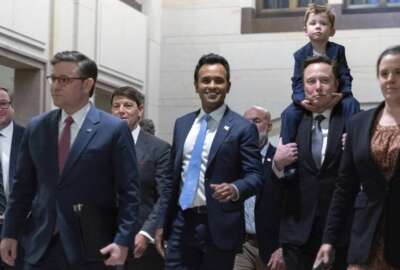Stimulus funds benefit DC-based feds
When you get past the national headlines, the American Recovery and Reinvestment Act of 2009 is about helping people at the state and local level hurt by the...
wfedstaff | June 2, 2015 10:33 pm
By Max Cacas
FederalNewsRadio
As members of Congress and economic leaders continue to debate the effect of the economic stimulus plan, many business leaders at the state and local level are finding that the program is helping those who are able to sign contracts with states and localities that have approved, and funded, stimulus projects — everything from paving roads, to clean water, and even renovating Federal agency buildings.
On Tuesday, the Greater Washington Board of Trade sponsored a Stimulus Opportunities Conference at the National Press Club in Washington.
The meeting was designed to help business leaders from D.C., Maryland and Virginia learn how to apply for stimulus projects managed by state and local governments, and to comply with funding regulations.
One of the mandates of the stimulus is that the projects help promote energy independence and be ecologically friendly.
Paul Prouty, acting administrator with the General Services Administration, says projects falling under his purview that are benefitting from the stimulus are also the office home to many D.C.-based feds:
- $61 million for the modernization of the Interior Department building
- $68 million to complete phase two of the modernization of the Mary Switzer Building, occupied by Health and Human Services.
- $138 million for the modernization of the Lafayette Building
- $161 million for the first phase of the modernization of GSA Headquarters (a building that he says still has window air conditioning units)
- $266 million to complete the renovation of the Hoover Building (FBI headquarters)
- $450 million for the first phase of the Department of Homeland Security headquarters complex now being built on the site of the old St. Elizabeth’s Hospital in Anacostia.
Ed DeSeve, the President’s special advisor on the stimulus program, told the conference that one of his challenges is explaining the very complex nature of some of the projects being funded by the stimulus.
Last Monday, news organizations headlined purchases of ham using stimulus funds.
DeSeve explained that the $1.2 million worth of ham went “to local food banks around the country to feed hungry people”, including in D.C., Maryland, and Virginia.
Joel Szabat, co-chair of the Transportation Department’s Stimulus TIGER team, outlined a number of local transportation projects being funded by stimulus dollars, including repaving of a runway at Dulles International Airport, paving on the Fairfax County Parkway, SouthWest Freeway, and New Hampshire Avenue, and rail equipment for the D.C. area Metro Transit System.
Barbara Reese, who supervises stimulus spending for Virginia Governor Tim Kaine, sais that last Monday, they got word that a small $2 million paving project in southwest Virginia helped to create 19 new jobs fror a local paving company.
Conference attendees were advised that the best place to track newly posted business opportunities from the stimulus is the Federal contracting Web site: FedBizOpps.
—
On the Web:
Greater Washington Board of Trade Stimulus Conference — Web site (pdf)
(Copyright 2009 by FederalNewsRadio.com. All Rights Reserved.)
Copyright © 2025 Federal News Network. All rights reserved. This website is not intended for users located within the European Economic Area.





